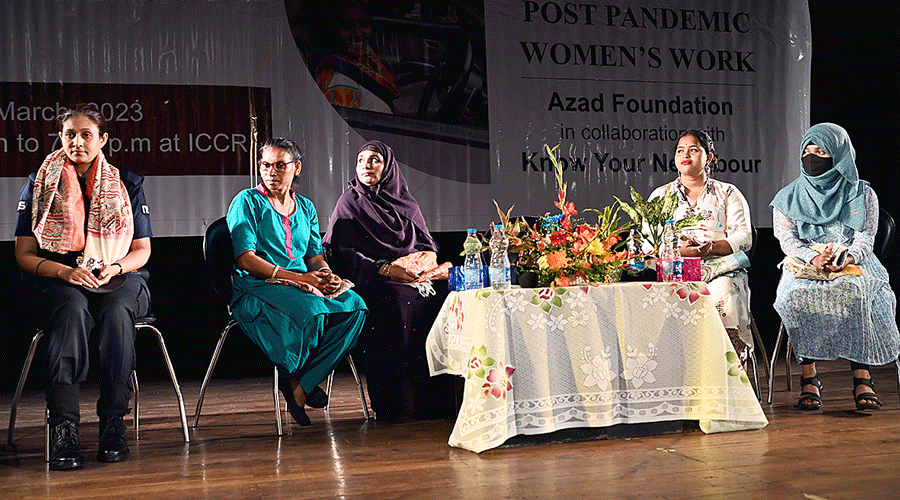A woman driving an app cab. Another delivering parcels in and around Chingrighata. A third guarding the gates of a private hospital off EM Bypass.
A handful of women who earn to keep the kitchen fire burning were part of a programme on working women’s participation in the workforce, before and after the Covid pandemic, at a city auditorium on Thursday night.
Archana Munda, who lives in Narayanpur, drives an app cab. She spends around 10 hours on the road daily. She has to manage all household work before, after or in between her driving.
Munda’s husband, a cleaner, spent a lot on drinking and pushed the family to penury. When an NGO was offering women in her locality a chance to learn to drive, Munda sniffed a chance. That was in 2016.
Till 2019, she worked as a parking attendant at a hospital.
Munda bought a hatchback through a state government scheme in 2019. The NGO that trained her supported her in buying the car.
Her husband was opposed to her becoming a “taxi driver”. She would not last a week as a driver because she would be abused and she was unfamiliar with the city’s roads, her husband had warned.
“But I was used to being abused by my husband. How worse can I be treated outside?” Munda told The Telegraph on the sideline of the programme.
Today, she is “happy” that she listened to her heart. Her biggest fear was not harassment but parking. “Initially, I was scared of parking the car properly, especially in a narrow space. But not any more,” said Munda.
Soma Mukherjee, who works as a guard at a private hospital, is the only child of her parents. She is not married.
She stepped out to work to support her family. Her father does not have any pension and her mother has always been a homemaker.
“I was told that my father wanted a son. He was not happy when I was born. But now, he is proud of me. He tells relatives that a son would not have taken care of him like I do,” Mukherjee, a Behala resident, said from the stage, her voice choking.
Thursday’s programme was a collaboration between Know Your Neighbour, a campaign that works for social amity, and Azad Foundation, which provides “livelihoods with dignity” for marginalised women in urban areas.
The organisers spoke on women’s participation in the workforce, before and after the pandemic.
“Even before the pandemic, the percentage of women in the Indian workforce was very low. Many working women lost their jobs in Covid, mainly because most of them were in the informal sector,” said Sabir Ahamed of Know Your Neighbour campaign.
Dolon Ganguly of Azad Foundation said the struggle for the rights of women should align with the struggles of other marginalised groups like Dalits, Muslims and transgenders.
Akanksha Bhaskar, a joint secretary in the Bengal panchayat and rural development department, who was the chief guest, said women’s participation in the workforce had been headed south since 2015. “If we are on the cusp of economic greatness, why this disparity,” she asked.
